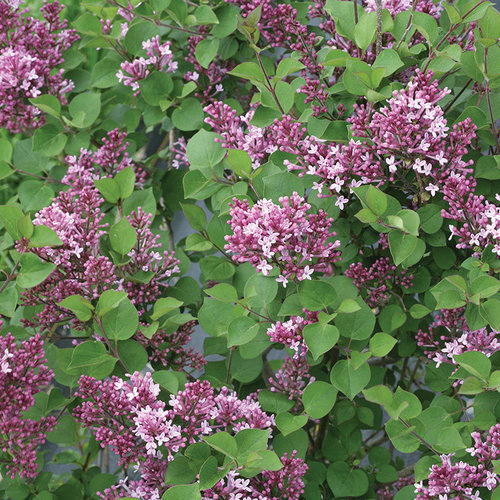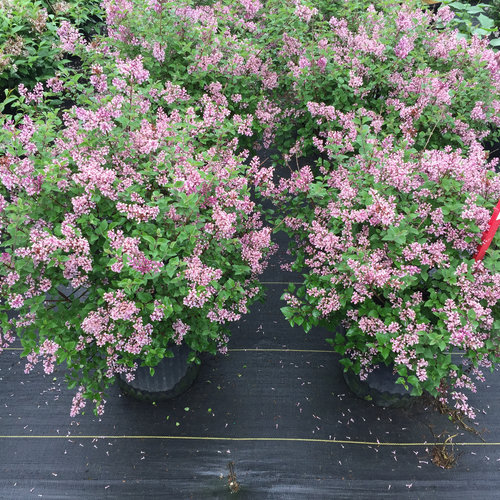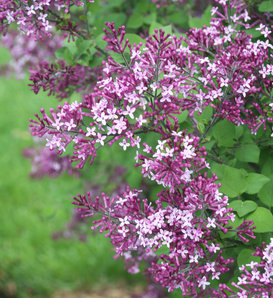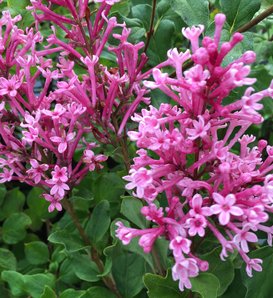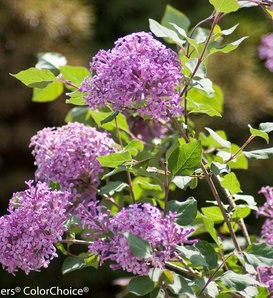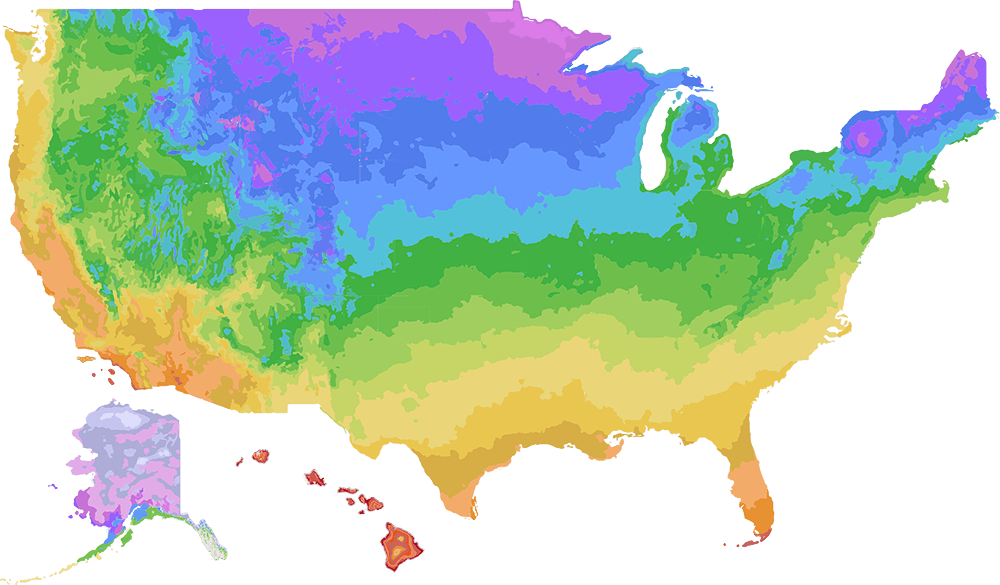This is a true experiment. My mom grew up in Zone 4A Colorado and wanted a lilac in our 9B California Garden. They require alkaline soil and all our garden is acidic with redwoods and oaks. So this guy is in a large pot in a full-sun (fully exposed) location. Our chill hours are borderline for what lilacs require to bloom the following year...so... we'll see this coming Spring. The specimen arrived in great condition, it transplanted well. It struggled with summer sun a bit and lost some leaves. It did fine though. It set some buds and has faired our wet windy winter okay. I hope I can report something surprising this coming Spring...stay tuned!
Bloomerang® Dwarf Purple Reblooming Lilac Syringa x
- Sun
- Spring
- Summer
- Fall
-
30 - 36 Inches30 - 36 Inches30 - 36 Inches76cm - 91cm76cm - 91cm76cm - 91cm
Features
This variety is no longer available from Proven Winners®. Alternatives include: Bloomerang® Purpink.
Everything you want in a lilac, and more!
Think you don't have room for a lilac? Think again! Bloomerang® Dwarf Purple lilac naturally grows as a small, rounded shrub, at just about a third the size of conventional lilacs. It outperforms other lilacs with its perfectly purple blooms that cover the plant in late spring, then reappear throughout summer and fall. Plus, it's vigorous and resistant to disease. Just plant it in full sun, soil that's not too wet, and enjoy the show for years to come. Available in better garden centers in spring 2019.
Top reasons to grow Bloomerang® Dwarf Purple lilac:
- Dwarf habit takes up just a fraction of the space of other lilacs.
- Fragrant purple flowers for months every year.
- Rarely bothered by deer or disease.
Attracts:ButterfliesResists:DeerCharacteristics
Plant Type:ShrubShrub Type:DeciduousHeight Category:ShortGarden Height:30 - 36 Inches 76cm - 91cmSpacing:30 - 36 Inches 76cm - 91cmSpread:30 - 36 Inches 76cm - 91cmFlower Colors:PurpleFlower Shade:PurpleFoliage Colors:GreenFoliage Shade:GreenHabit:UprightContainer Role:FillerPlant Needs
Light Requirement:SunThe optimum amount of sun or shade each plant needs to thrive: Full Sun (6+ hours), Part Sun (4-6 hours), Full Shade (up to 4 hours).
Maintenance Category:EasyBlooms On:New WoodBlooms On:Old WoodBloom Time:Summer through FallBloom Time:Late SpringHardiness Zones:3a, 3b, 4a, 4b, 5a, 5b, 6a, 6b, 7a, 7bWater Category:AverageNeeds Good DrainageSoil Fertility Requirement:Average SoilSoil PH Category:Alkaline SoilUses:Border PlantUses:ContainerUses:Cut FlowerUses:Good for ScreeningUses:LandscapeUses:Mass PlantingUses:Specimen or Focal PointUses Notes:A dwarf lilac like Bloomerang Dwarf Purple offers a lot of versatility in the landscape. Plant it lining a walkway, under windows, as a low hedge, or anywhere you want color and fragrance with minimal care.
Maintenance Notes:Plant only in full sun and well-drained soil; lilacs cannot tolerate soggy, wet conditions.
How to Grow Lilacs: Learn more about growing lilacs in this complete care guide
The rebloom of Bloomerang lilac occurs on the new growth the plant creates after its spring bloom. For the best rebloom, it's vital that the plant grows vigorously during late spring and early summer. Do this by keeping it well-watered and mulched and in plenty of sun (six hours a day at least). If you wish to fertilize it, you may do so in early spring, once the ground has thawed, and again in late spring, after it blooms.
If you want to prune Bloomerang lilac, do so immediately after its spring bloom. Never cut it back in fall, winter, or early spring - doing so will remove the spring flower buds. It is not necessary to prune Bloomerang lilac in order for it to rebloom. However, giving it a light trim after blooming does remove the developing seed heads (they look like green bananas, and some people don't care for the way they look on the plant), providing a neater look, and encourages more new growth for reblooming. Trimming after blooming will delay the rebloom by a few weeks compared to an untrimmed Bloomerang lilac.
Like nearly all lilacs, Bloomerang lilac actually requires a period of cold weather in order to bloom well. This is why lilacs are not typically suited to warmer climates. However, they are very, very cold tolerant and thrive in climates as cold as USDA zone 3.
Fun Facts:The botanical name of lilac, Syringa (suh-RIN-gah), is from the Greek word syrinx, which means tube. This is because the stems of lilac contain a spongy pith which can be remove, leaving a hollow tube that has traditionally been used to create pan-pipes.
Bloomerang® Dwarf Purple Syringa x 'SMNJRPU' USPP 29,831, Can 6,774 -
5441322211Browse reviews from people who have grown this plant.
-
Lara Boucher, California, United States, 2 years ago
-
We actually received our plant 5 years ago at the Mackinac Island lilac festival. We were told to leave it in the pot and dig the pot into the ground for the first year. Then plant it the next year. I’ve never done that before, but it worked. It’s done well here on Old Mission Peninsula. It gets full sun. It rebloomed well last year. It wasn’t covered with blooms this Spring, but definitely more than last year. I’m definitely happy with it.
Barb Hansen, Michigan, United States, 3 years ago -
We actually received our plant 5 years ago at the Mackinac Island lilac festival. We were told to leave it in the pot and dig the pot into the ground for the first year. Then plant it the next year. I’ve never done that before, but it worked. It’s done well here on Old Mission Peninsula. It gets full sun. It rebloomed well last year. It wasn’t covered with blooms this Spring, but definitely more than last year. I’m definitely happy with it.
Barb Hansen, Michigan, United States, 3 years ago -
3rd season, no problems with the bush. This year the lilac is blooming like crazy! The dark purple flowers are gorgeous! And they are small and perfect for my front yard. I’ve been considering adding more of the same lilacs to my garden.
Estella, Ontario, Canada, 3 years ago -
I planted 14 larger plants of these 3 years ago. 8 are thriving. In fact, they are growing too well . I am cutting them back after they bloom in the spring and in the late fall. They are loaded with blooms in the spring but seldom rebloom. Possibly because of cutting back but they have never rebloomed much. Deer have pruned 3 almost to the ground therefore they haven’t bloomed at all. And 3 are planted where they are getting too much water, I plan to move them. I would not plant them again as they get too leggy and don’t bloom enough for me during the entire season.
Mama P, Nebraska, United States, 3 years ago -
This plant has done very well, planted this spring from a 2 gallon starter in early spring. It’s grown 12 inches on about 30 branches and is setting a second bloom right after 4th of July. Smell is classic.
Benaji, Idaho, United States, 4 years ago -
So far so good. Plant was a bit smaller than expected but that's my own fault for having high expectations. It's doing okay in my garden... it's been in the ground for a few weeks now, is still alive, and doesn't seem stressed at all. No sign of growth yet but hopeful that it blooms or at least gets bigger!
jay, Illinois, United States, 6 years ago
-



